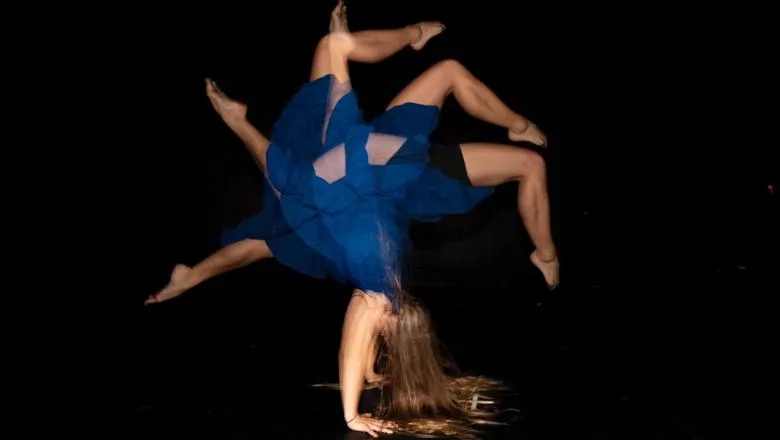Although these words are powerful, words alone can sometimes struggle to describe our inner thoughts. Seeing this problem, the Feedback Loops team wanted to see if wearable devices and the arts can join forces to reveal the unseen and help us learn more about being human.
Alina Ivan, a researcher on the RADAR-CNS project focused on the depression study, Department of Psychological Medicine, Institute of Psychiatry, Psychology & Neuroscience, King’s College London
19 November 2020
Interdisciplinary dance performance Feedback Loops highlight of Science in the City Malta festival
The immersive performance, Feedback Loops, is based on the RADAR-CNS study which is investigating how wearable technologies and mobile phones can track and help prevent depression, epilepsy and multiple sclerosis.

RADAR-CNS is jointly led by King’s College London and Janssen Pharmaceutica NV. Feedback Loops brings together dance, music (generated from live human body data) and people’s stories to share an insight into the relationship between mind and body.
The performance later in November 2020 will be part of the Science in the City, Malta’s national science and arts festival.
“A lot of my symptoms are invisible and people find it hard to understand what I’m going through”. – a quote from one of the RADAR-CNS Patient Advisory board.
RADAR-CNS brings together clinicians, researchers, engineers, computer scientists and bioinformaticians from all over the world. The project is funded by the Innovative Medicines Initiative - a Public Private Partnership set up between the European Federation of Pharmaceutical Industries and Associations (EFPIA) and the European Union). It includes 22 organisations from across Europe and the US.
Feedback Loops is a collaboration between creatives, researchers, and technology experts, including:
- Alina Ivan, production and lead
- Anna Spink, dancer
- Dan Wimperis, music
- Chris Scott, filmmaking
- Andrea Biondi, Valeria de Angel, (and Alina Ivan), RADAR-CNS researchers based at King’s College London and Matteo Martinis
- Yatharth Ranjan, Pauline Conde, Software developers based at King’s College London
- Callum Stewart, a bioinformatician based at King’s College London
- And with help from people with lived experiences of depression, epilepsy and multiple sclerosis from our patient advisory board lead by Dr Sara Simblett, Institute of Psychiatry, Psychology & Neuroscience
- With thanks to Ed Saunders for lighting design and the Blue Elephant Theatre in London.
With slow, forceful heaviness as an overriding movement quality throughout the piece, I have depicted some of the visible and invisible symptoms of depression. I have included changes of focus, lower planes of motion and specific gestures to abstractly demonstrate guilt, difficulty making decisions and feeling “itchy” or uncomfortable in one’s own skin.
Dancer Anna Spink
Musician Dan Wimperis says, “The sonification is two parts, a Python script that converts the live data into musical notes and controls, and a music project that takes in the musical notes and controls and generates the sounds based on the data.
Throughout the performance the dancer’s movements controls which notes are being played, the blood volume pulse (the graph on a heart rate monitor) is controlling the probability of notes being played and the volume of the notes (how hard a pianos key is pressed) and the electrodermal activity (the amount of sweat on their skin) is controlling how the notes sound, either bright or dark, far away or close etc.”
Alina Ivan adds, “It’s been such an exciting project to work on with collaborators based in London, Bristol and Milan. It has been very satisfying to have this shared intellectual space where we could share ideas (especially throughout the lockdown!) and work towards a shared goal!
“Thank you so much Science in the City and RADAR-CNS for providing this opportunity! We are looking forward to the festival and feedback from the public! This is a performance for everyone - there is no previous experience with the arts or science needed.”
Watch an interview about the performance with Alina Ivan and Newsbook, Malta here.
Sign up to attend the Feedback Loops events taking place during Science in the City Malta.
Friday 27 November, 19:00-20:15 GMT Feedback Loops Performance Premiere
Saturday 28 November, 19:25- 20:30 GMT Screening, Q&A with the makers and the mental health Richmond Foundation Malta
Sunday 29 November, 17:00-18:10 GMT, Feedback Loops Performance Premiere screening, Q&A with the makers and a mindfulness exercise
This year, the festival will be held entirely online with pre-festival events starting from 12 November and the main festival on 27-29 November. Its aim is to provide a memorable platform for citizens to engage with scientists, researchers, artists and performers. The theme is “Engage, Empower, Enable”, highlighting that research is geared towards the advancement of the individual, leading to the betterment of the whole world.
Photo credit: Anna Spink in rehearsal by Chris Scott Studio
